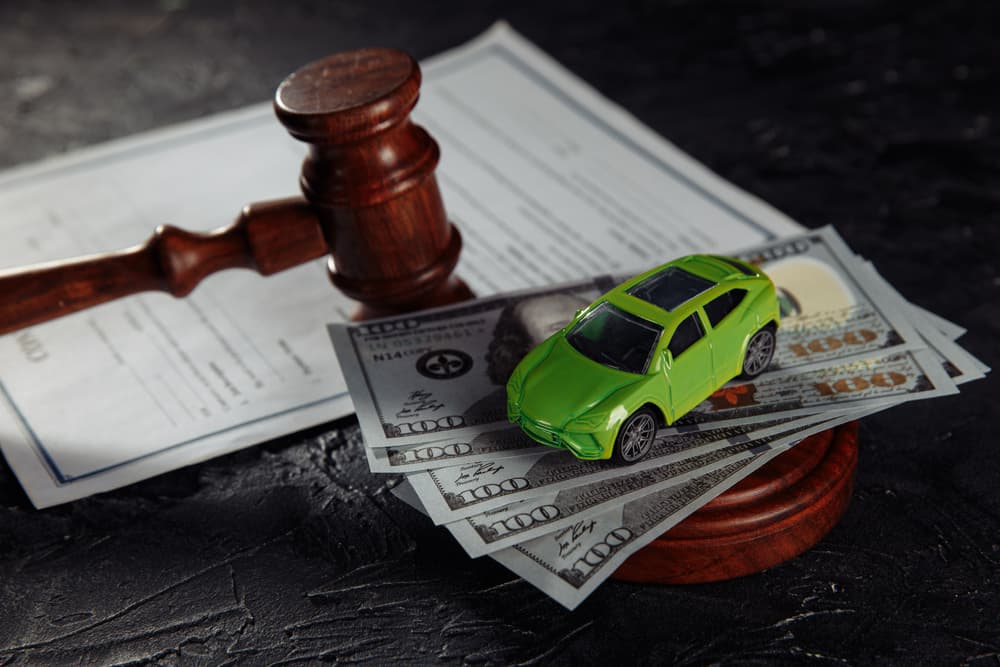Quick Answer
If you've been hurt in an accident that wasn't your fault, a personal injury lawyer can help you understand your rights, build your case, and recover compensation.
They may get bad press and some don’t help themselves with their tactics, but we would be lost without them.
Whatever your opinion, a good personal injury lawyer can be a literal lifesaver.
You don’t need a lawyer if you’re using the Mighty.com AI claims helper, but if you are, this is the post for you.
We explain what personal injury lawyers do, how to choose the right one, and what to expect from the legal process.
1. Personal injury lawyer qualifications
Let’s start at the very beginning. What qualifies an injury lawyer to do what they do?
A qualified personal injury lawyer typically has:
- A law degree (Juris Doctor) from an accredited university.
- Passed the bar exam in their practicing state.
- Experience or specialized training in tort law, which covers civil litigation for personal injury.
- Membership in professional organizations such as the American Bar Association or local trial lawyer associations.
Many top personal injury lawyers also have a track record of trial success or high-value settlements, strong negotiation skills, and ongoing legal education in personal injury law.
2. What does a Personal Injury Lawyer Do?
Personal injury lawyers represent clients who have been injured as a result of someone else’s negligence, recklessness, or intentional conduct.
Their work includes:
- Investigating accidents and collecting evidence.
- Negotiating with insurance companies.
- Filing legal claims on behalf of the injured party.
- Representing clients in court if a settlement can't be reached
Most lawyers in this field work on a contingency fee basis, meaning they only get paid if you win your case or reach a settlement.
3. Types of personal injury lawyers
There are several sub-specialties within personal injury law.
Some lawyers focus on specific areas, such as:
- Car accidents: Helping clients recover damages from vehicle crashes.
- Medical malpractice: Representing people harmed by medical errors.
- Slip and fall: Cases involving injuries on someone else’s property.
- Product liability: Injuries caused by faulty or dangerous products.
- Workplace accidents: Especially those not covered under workers’ compensation.
- Wrongful death: Supporting families of loved ones who died due to negligence.
Choosing a lawyer who has experience in your type of case can make a significant difference to the outcome.
4. How to hire a personal injury lawyer
Hiring the right personal injury lawyer involves several steps. The more effort you put in here, the better the results.
- Research local firms: Look for lawyers who specialize in your type of case.
- Read reviews and testimonials: Focus on client experiences and case results.
- Request a free consultation: Most personal injury lawyers offer a no-cost initial meeting.
- Ask questions: Understand how they work, their success rate, and their fee structure.
- Compare your options: Don’t feel pressured to hire the first lawyer you meet.
Make sure you’re comfortable with how the lawyer communicates and whether they listen to your concerns.
Most importantly, make sure you understand how the lawyer works, what’s expected of you and their exact fee structure.
5. What to look for in a personal injury lawyer
A good personal injury lawyer should have:
- Experience with similar cases
- Clear communication: They should explain things in plain language.
- Good negotiation skills: Most cases are settled out of court.
- Trial readiness: If your case does go to trial, they need to be prepared.
- No upfront fees: Reputable lawyers usually work on contingency.
- Transparency: You should understand their fees and expectations.
Red flags include vague answers, lack of experience, pressure to sign contracts quickly, and poor communication.
6. The PI claim process: Step-by-step
It will help your lawyer, and you, if you have an idea of what to expect during your time together.
This information is also useful if you choose to use the Mighty.com service to self-file a personal injury claim instead.
A typical personal injury claim follows a structured process.
Here’s how it usually works:
- Initial consultation (1–2 days): You meet with a lawyer to review your case, understand your options, and decide whether to proceed.
- Investigation (1–4 weeks): The lawyer gathers evidence, photos, medical records, witness accounts, police reports and anything else to help the case.
- Medical treatment and recovery (Varies): You continue or complete treatment. Your lawyer may wait to assess long-term impacts before proceeding.
- Demand letter (2–4 weeks after recovery): Once your medical status is stable, your lawyer sends a demand letter to the insurance company requesting compensation.
- Negotiation phase (4–8 weeks): Insurers may accept, deny, or counter the demand. Your lawyer negotiates on your behalf.
- Settlement or lawsuit filing (2–6 weeks): If a fair settlement can’t be reached, your lawyer may file a lawsuit.
- Discovery phase (3–6 months): Both sides exchange evidence and may take depositions.
- Mediation or pre-trial settlement (1–2 months): Courts often encourage mediation before trial. Many cases are settled here.
- Trial (1 week to several weeks): If no settlement is reached, the case goes to trial.
Timeframes vary based on case complexity, injuries, and court schedules. Some cases settle in a few months, while others may take over a year.
7. What is the statute of limitations for personal injury claims?
The statute of limitations sets the deadline for filing a personal injury lawsuit.
In most states, you typically have two to three years from the date of the accident or injury to take legal action.
However, this time limit can vary depending on where you live and the nature of the case.
Some exceptions and nuances to be aware of:
- In cases involving minors, the clock may not start until the child turns 18.
- If the injury wasn’t discovered right away, such as with a medical misdiagnosis, the deadline might begin from the date you discovered or should have discovered the harm.
- Claims against a government agency (like if you were injured on public property or by a city employee) often have a much shorter notice period, sometimes as little as 90 days to file an initial claim.
Missing the statute of limitations generally means you lose the right to sue, no matter how strong your case may be.
That’s why it’s important to assess your situation as early as possible.
Then you can decide whether to file your own claim with the Mighty.com AI claims helper or consult an attorney.
8. What happens if I’m partially at fault?
Even if you were partly responsible for an accident, you may still be entitled to compensation.
How much you can recover depends on your state’s rules around comparative fault or contributory negligence.
Here’s how it generally works:
- Pure comparative negligence (e.g., California, New York): You can recover damages even if you were 99% at fault. However, your compensation will be reduced in proportion to your share of the blame. If you were awarded £100,000 and were 30% at fault, you’d receive £70,000.
- Modified comparative negligence (e.g., Texas, Colorado): You can still recover damages as long as you were less than 50% or 51% at fault, depending on the state. If you were more at fault than the other party, you may be barred from recovery.
- Contributory negligence (e.g., Maryland, Alabama): These are the strictest states. If you’re found to be even 1% at fault, you may not be able to recover anything.
A skilled personal injury lawyer will work to minimize the percentage of fault assigned to you and gather evidence to show the other party’s greater liability.
It’s one of the reasons experienced legal representation matters so much in more complex personal injury cases.
9. Personal injury lawyer FAQs
What do personal injury lawyers do?
They handle all legal aspects of an injury claim including investigating the accident, proving liability, negotiating with insurance companies, and, if necessary, taking your case to court to seek compensation.
You’ll be expected to cooperate with them at all times, but otherwise, the lawyer handles everything.
How much does a personal injury lawyer cost?
Most work on a contingency fee basis, typically taking 30–40% of your settlement or court award. You should clarify whether they deduct expenses before or after their fee is calculated.
Some lawyers will take your case for free but charge for every possible extra. Make sure you know exactly what your lawyer charges for and how much.
How do I find a personal injury lawyer?
You can find one through:
- Recommendations from friends or family
- Local bar association directories
- Online legal directories like Avvo or Martindale-Hubbell
- Search engines and reviews
Always look for someone with a good reputation and experience in your type of injury claim.
You’ll be very familiar with their ads on TV and on bus benches. Use one of those by all means but research them thoroughly before committing.
What questions to ask a personal injury lawyer?
Your initial consultation is a chance for you to explain your case but also to check out the lawyer. Ask as many questions as you can until you have the information you need.
Here are some smart questions to ask during a consultation:
- How long have you practiced personal injury law?
- Have you handled cases like mine before?
- What is your success rate?
- What are your fees and how are they structured?
- Who will be handling my case? Will it be you or someone else in the firm?
- How long will my case take?
- Will I be responsible for any costs if we don’t win?
- What, if any, extra fees will I be charged during my case?
Final thoughts
A personal injury lawyer can make the process of recovering compensation less stressful and more successful.
Take your time, ask the right questions, and work with someone who puts your needs first.
Whether you’re dealing with a car accident, workplace injury, or another type of accident, the right lawyer can help you move forward with confidence.
If you don’t want to use a lawyer, the Mighty.com AI claims helper is always available to assist!
Know Your Claim’s Worth—and Settle It
Serious injury or no injury at all, move your case forward instantly from your phone.
Thank you for submitting your information.

About the author
Joshua is a lawyer and tech entrepreneur who speaks and writes frequently on the civil justice system. Previously, Joshua founded Betterfly, a VC-backed marketplace that reimagined how consumers find local services by connecting them to individuals rather than companies. Betterfly was acquired by Takelessons in 2014. Joshua holds a JD from Emory University, and a BA in Economics and MA in Accounting from the University of Michigan.






